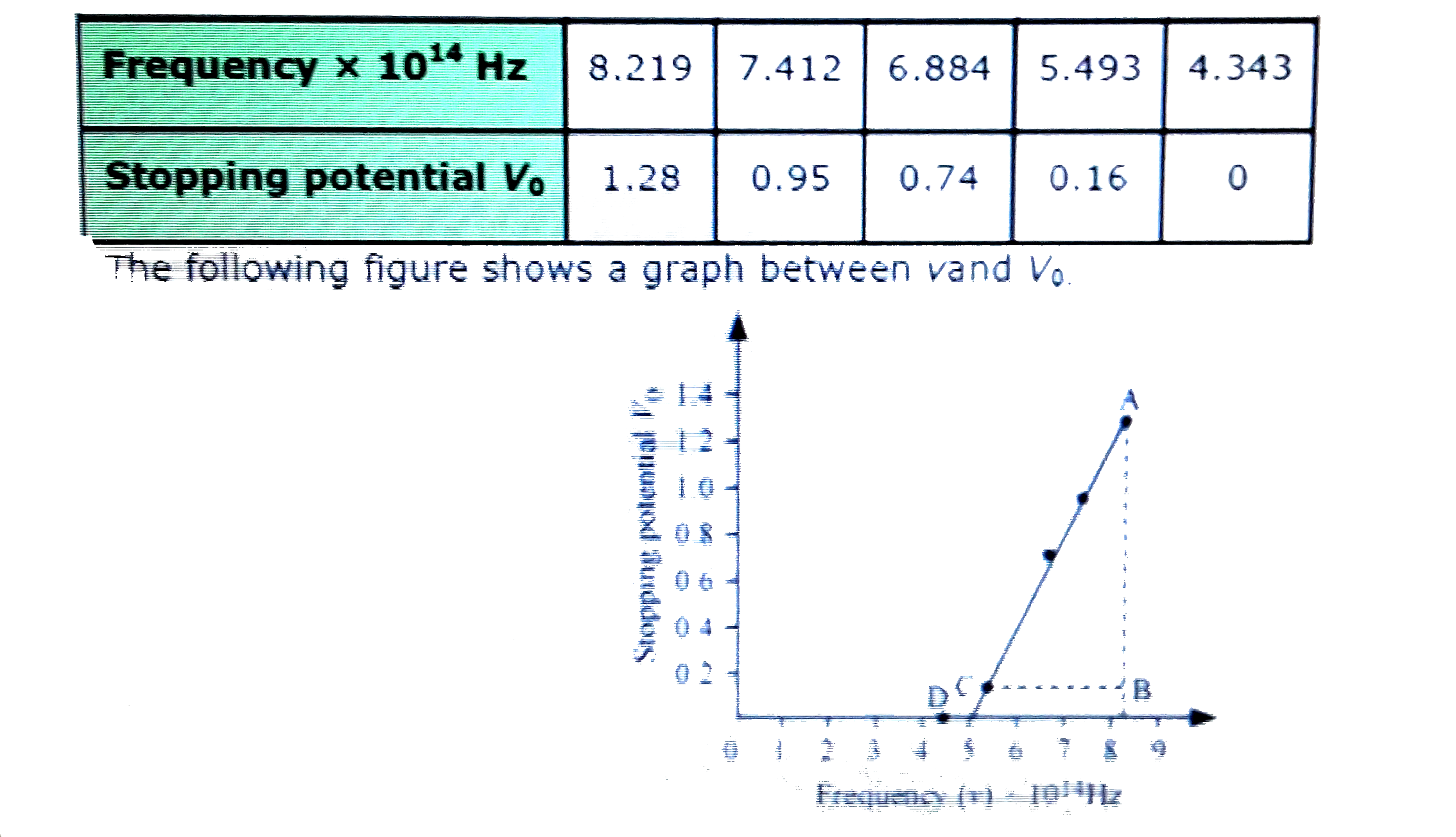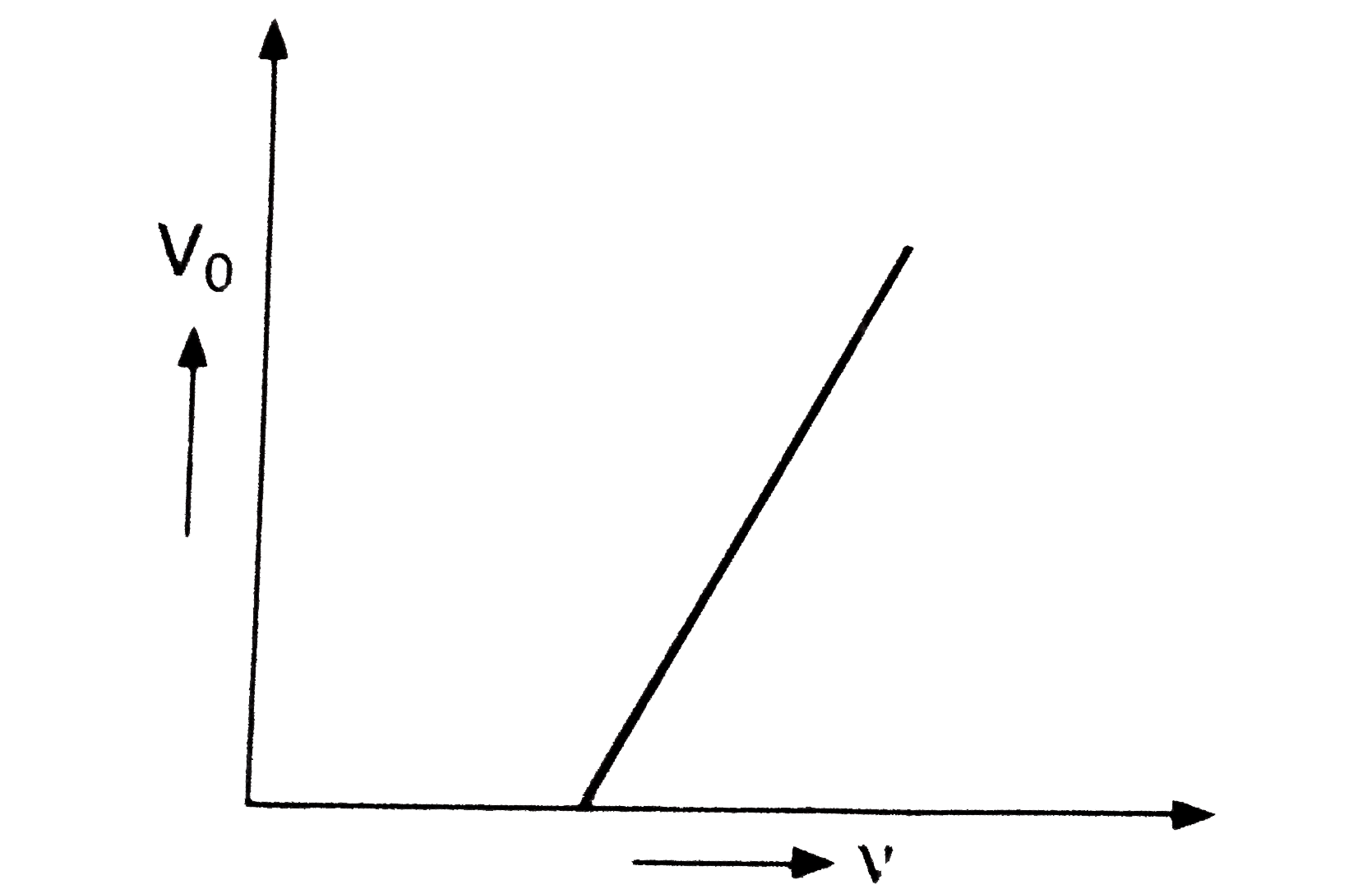A mercury lamp is a convenient source for studying frequency dependence of photoelectric emission, since it gives a number of spectral lines ranging from the UV to the end of the red visible spectrum. In our experiment with rubidium photocell, the following lines from a mercury source were used: λ1=3650A∘,λ2=4047A∘,λ3=4358A∘,λ4=5461A∘,λ5=6907A∘ The stopping voltages, respectively were measured to be:
V01=1.28V,V02=0.95V,V03=0.74V,V04=0.16V,V05=0V.
(a) Determine the value of Planck's constant h.
(b) Estimate the threshold frequency and work function for the material.
Einstein's photoelectric equation is given as:
eV0=hv−ϕ0
V0=hev−(ϕ)0e....(1)
Where,
V0 = Stopping potential
h= planck's constant
e= Charge on an electron
v= Frequency of radiation
ϕ0 = work function of a material
It can be concluded from equation (1) that potential V0 is directly proportional to frequency v.
Frequency is also given by the relation:
v=Speed of light(c)Wavelength(λ)
This relation can be used to obtain the frequencies of the various lines for the given wavelengths.
v1=c(λ)1=3×1083650×10−10=8.219×1014Hz
v2=c(λ)2=3×1084047×10−10=7.412×1014Hz
v3=c(λ)3=3×1084358×10−10=6.884×1014Hz
v4=c(λ)4=3×1085461×10−10=5.493×1014Hz
v5=c(λ)5=3×1086907×10−10=4.343×1014Hz
The given quantities can be listed in tabular form as:

The following figures shows a graph between v and V0.
It can be observed that the obtained curve is a stright line. It intersects the v-axis at 5×1014Hz, which is the threshold frequency (v0) of the material. Point D corresponds to a frequency less than the threshold frequency. Hence, there is no photoelectric emission for the λ5 line, and therefore, no stopping voltages is required to stop the current.
Slope of the straight line =ABCB=1.28−0.16(8.214−5.493)×1014
From equation (1), the slope he can be written as:
hv=1.28−0.16(8.214−5.493)×1014
∴h=1.12×1.6×10−192.726×1014
=6.573×10−34Js
The work fuction of the metal is given as:
ϕ0=hv0
=6.573×10−34×5×1014
=3.286×10−19J
=3.286×10−191.6×10−18=2.054eV
Topper's Solved these Questions
- DUAL NATURE OF RADIATION AND MATTERBook:NCERTChapter:DUAL NATURE OF RADIATION AND MATTERExercise:Exercise
Explore 37 Videos
- CURRENT ELECTRICITYBook:NCERTChapter:CURRENT ELECTRICITYExercise:EXERCISE
Explore 23 Videos
- ELECTRIC CHARGES AND FIELDSBook:NCERTChapter:ELECTRIC CHARGES AND FIELDSExercise:EXERCISE
Explore 34 Videos
Similar Questions
A mercury lamp is a convenient source for studying frequency dependence of photoelectric emission, since it gives a number of spectral lines ranging from the UV to the red and end of the visible spectrum. In our experiment with rubidium photocell, the following lines from a mercury source were used:
λ1=3650Å,λ2=4047Å,λ3=4358Å,λ4=5461Å,λ5=6907Å
The stopping voltages, respectively, were measured to be:
V01=1.28V,V02=0.95V,V03=0.74V,V04=0.16V,V05=0V
Determine the value of Planck's constant h, the threshold frequency and work function for the material.
View SolutionWrite Einstein’s photoelectric equation. Define the threshold frequency v0 and stopping potential V0.
View Solution
Knowledge Check
A photon of frequency v causes photo electric emission from a surface with threshold frequency v0. The de-Broglies wavelength (λ) of the photo electron emitted is given by:
AΔn=h2mλBΔn=hλC[1v0−1v]=mc2hDλ=√h2mΔVIf λv,λmandλx represent wavlength of visible light, microwaves and X - rays respectively, then
Aλm<λx<λvBλv<λm<λxCλx<λv<λmDλm<λv<λxif λv',λx and λm represent the wavelengths of visible light X-rays and microwaves respectively then:
Aλm>λx>λvBλk>λm>λxCλm>λv>λxDλy>λx>λm
Derive the equations v=nλ , where n and λ are frequency and wavelength .
View SolutionIn photoelectric effect the slope of straight line graph between stopping potential (V0) and freqency of incident light (v) gives:

View SolutionThe stopping potential are V1 and V2. Calculate the (V1−V2), if the λ1 and λ2 are wavelength of incident lights, respectively.
View SolutionIf V1 and V2 are veloctities of light in two different media, then the ratio of wavelength of light in the same media λ1λ2=
View SolutionIf λv,λx and λm represents the wavelength of visible light X-ray and microwave respectively then :
View Solution

